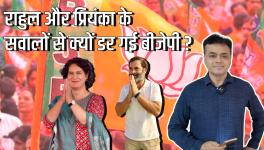How Social Media Makes Empathy Hard to Nurture

The pandemic and lockdown have turned India into a sea of suffering whose small fish, the working class and the poor, have been subjected to unimaginable trouble, pain and suffering. The Great Indian Middle Class has expressed sorrow, pain and empathy over tragic developments of the last two months; be it the train accident in Aurangabad in which 16 migrant workers died or the Visakhapatnam gas leak which killed six people and revived memories of the Bhopal gas tragedy, or the toddler who tried to wake up his dead mother in Bihar.
The horrific images and tragic stories has led to much outpouring of empathy, as is evident from the flurry of poems, posters and doodles that express anger and misgivings in creative form. Such creative expressions of fury and sympathy have followed every tragic event, even the recent killing of a wild elephant.
Yet, despite the outrage (which is admittedly mostly to be seen on social media platforms), we do not see a concrete sociopolitical action emerging from the middle class. We have not seen demands raised to fix accountability, nor have hard questions been directed at the government over these tragic occurrences. A strong acceptance of the situation is contrarily evident. This manifested in some recent surveys, whose veracity has been questioned, but which nevertheless claim that approval for Prime Minister Narendra Modi has increased during the nationwide unprecedented crisis. What explains this contradiction? Why is there a gap between the outrage and action, even if limited to questioning the authorities in charge?
The ancient Greeks may have some answers to offer. Aristotle said in Poetics, his work on dramatics—which is really an exposition on human emotions—that “pity and fear” lead to a “proper purgation” of emotions. Madelaine Hron, a professor of English and film studies at Laurier, has explained Aristotle’s argument in her book, Translating Pain: Immigrant Suffering in Literature and Culture in this way: “...Aristotle argued that experiencing pity, specifically in response to the performance of a tragedy, would purge the audience of violent emotions (catharsis), which as a result, would lead to a ‘good life’ of sensible moderation of these emotive states.”
Aristotle’s “purgation” roughly translates to the English word, catharsis, a concept that is widely used both in theatre and psychiatry. Catharsis implies renewal and restoration of emotional turbulence in the wake of a tragedy. Even beyond the literary world, the function of catharsis is akin to a therapy that helps cope with cataclysmic events. The poet and playwright Bertolt Brecht has argued that catharsis can trigger social inaction—the opposite of political and social engagement and activity—in one who experiences it.
This is because emotions, once resolved, can get people to attain “closure”, from where they can move on from the tragedy they have witnessed or even experienced. For this reason, Brecht did not favour the dramatic techniques of purgation, nor was he appreciative of the overt focus on the hero figure in drama.
But there is more to it. “Pity,” Aristotle said, “is aroused by unmerited misfortune, fear by the misfortune of a man like ourselves.” Seen in this light, the suffering of the poor or migrant workers is not something the comfortably-off middle class can easily relate to. Accordingly, they would also not fear that a similar misfortune would befall them. This could explain their veritable indifference to the unfolding human tragedy—at one level, the elites simply cannot imagine what the suffering they watched from the safety and comfort of their homes is really like.
Shocking images of human suffering are often considered a trigger for public anger. It is believed that they, as a rule, can force people to demand that responsibility be affixed on those who caused it. But even the French literary critic, Roland Barthes, felt that this was not the case. An audience of such images can respond in an unpredictable and entirely opposite manner. In Worlding: Identity, Media, and Imagination in a Digital Age, David Trend, who teaches art at the University of California, writes, “The pictures offer evidence of something the viewer will not experience. ‘Such images do not compel us to action, but to acceptance. The action has already been taken, and we are not implicated,’ Barthes writes. Put another way, such images tell us that we are safe and that the violence in the picture has befallen someone else—often in a faraway land.”
This wealth of prior literature raises a question before the mainstream media in particular, but also before activists and the middle class; there is need for an appropriate, preferably all-new, language to express tragedy that can propel people into action rather than inaction.
The art critic John Berger observed that reproduction of human suffering has been commodified in the modern consumerist society, which leads to de-politicisation of critical issues. Photographs of Agony, Berger’s 1972 essay, questions the effectiveness of war photography in the context of Vietnam war. But Berger also says in his book, About Looking, which was published in 1980, that when a viewer is suddenly confronted with such images, he momentarily shares the agony of the victim, but the abrupt confrontation creates a feeling of moral inadequacy or guilt. “Either he shrugs off this sense of inadequacy as being only too familiar, or else he thinks of performing some kind of penance, of which the purest example would be to make a contribution to OXFAM or UNICEF”.
The impact of this trade-off, according to Berger, is that no lasting political response to the suffering of people can take place.
It is evident that the “theories” of some of the leading media analysts and writers are working themselves out in India during the lockdown. The gap between outrage and adequate socio-political action, especially on part of netizens, can be understood through the words of Aristotle, Brecht, Barthes and Berger and others.
The horrific images and tragic stories, coupled with videos depicting brutalities, do create emotional turmoil. But social media becomes an outlet for anger or grief, and leads to catharsis. That is why even charitable efforts of individuals are regularly displayed on social media for broader consumption. This alleviates their guilt of having watched people suffer twice: first by making the actual donation and then by displaying it before the world.
Thus an ill-planned lockdown is not questioned; mismanagement of shramik trains is not questioned; and disastrous environment policies are not questioned. The tragedy of the migrant working class and poor have just been reduced to a drama, an Aristotelian tragedy which found its cathartic moment in twitter trending #MetooMigrant.
The author is a doctoral candidate at JNU. The views are personal.
Get the latest reports & analysis with people's perspective on Protests, movements & deep analytical videos, discussions of the current affairs in your Telegram app. Subscribe to NewsClick's Telegram channel & get Real-Time updates on stories, as they get published on our website.
























